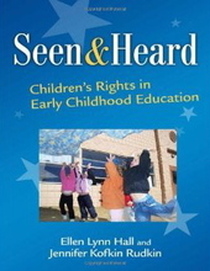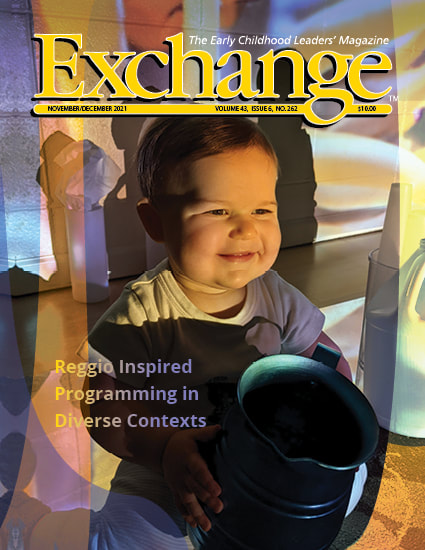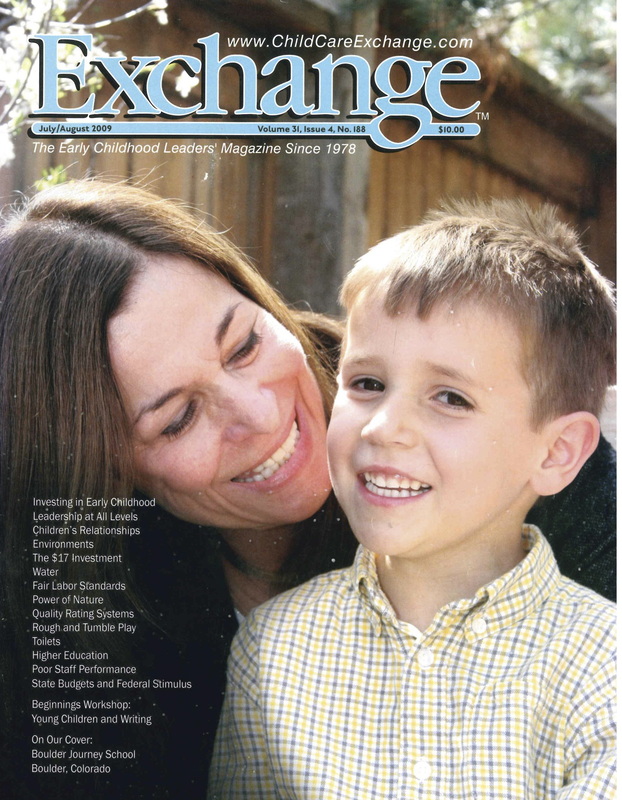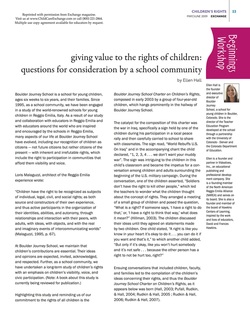We feel a strong sense of responsibility to share our work in many different ways, both to support other educators who might be curious about how we educate, and to support our own development as professionals.
Publications
Morgan, A. (2023). Using Technology with Infants and Toddlers. In A. Lewin-Benham (author), Infants and Toddlers at Work, (2nd ed., 186-193). Teachers College Press. New York.
Morgan, A. (2022). Deconstructing Science and Democracy: Making Meaning in a Convoluted Era. Innovations in Early Education: The International Reggio Emilia Exchange, Spring 2022, 18 - 33. Maher, A. & Ryan, L. (2021). Recognizing School as a Place of Learning for All: From Infancy through Graduate School. Exchange, November/December 2021, 34 - 37. Maher, A. (2020). Processes and possibilities in documenting children's learning. Exchange, January/February 2020, 54 - 57. Cruickshank, A., Hall, S. & Hall, E. (2017). The gift of fiction: Using technology to support empathy. Exchange, July/August 2017, 34 - 38. Boulton, P. & Hall, E. (2017). Children's rights in action: Children and adults as partner advocates. Exchange, March/April 2017, 68 - 74. Greenwood, M., Fowler, A., & Graham, K. with Boulton, P. & Hall, E. (2016). Images of rights: Children's perspectives project. Exchange, March/April 2016, 18 - 21. Maher, A., & Hall, E. (2016). Creating a culture of scientific inquiry among educators in an early childhood context. Exchange, May/June 2016, 57 - 60. Cruickshank, A., & Hall, E. (2015). Cultivate the scientist in every child: Using an exhibit as a catalyst for learning. Exchange, May/June 2015, 18 - 21. Hall, E., Howe, S., Roberts, S., Foster-Shaffer, L., & Williams, E. (2014). What can we learn through careful observation of infants and toddlers in nature?Children, Youth and Environments, 2014, Volume 24(2). Forman, G. & Hall, E. (2013). Wondering with children: The importance of observation in early education. LEARNing Landscapes, Volume 7(1). Shaffer, L., Hall, E. & Lynch, M. (2013). Toddlers’ scientific explorations: Encounters with insects. Spotlight on Young Children: Exploring Science, 11-16. Maher, A., Hall, E. & Stevans, L. (2012). A learning community that supports creativity. In R. Kelly (Ed.), Educating for creativity: A global conversation, 173-186, Calgary, Alberta, CA: Brush Education. Shaffer, L., Bauer, A. & Hall, E. (2013). Children as city planners: A story of civic engagement from Boulder, Colorado. Exchange, July/August 2013, 70-75. Hall, E. & Graham, K. (2013). Are we listening? Hearing the voice of the child. Journal of Early Childhood Development, Volume VI, 1-12. Hall, E. & Maher, A. (2012). A conversation about children’s rights. Exchange, May/June 2012, 24-26. Hall, E. (2012). Response to Boulton, P., A Focus on Children’s Rights and the U.N. Convention on the Rights of the Child. The Voice for Children on Campus, 7(2), 10-12. Hall, E. & Maher, A. (2012). Children have a right to… An exploration of children’s rights in early childhood education. Independent School, 78-82. Shaffer, L., Hall, E., & Lynch, M. (2011). Toddlers’ scientific explorations: Encounters with insects. Spotlight on Infants and Toddlers, 49-55. Spahn, D., Hall, E., & Kluger-Bell, B. (2011). Encounters with sunlight and a mirror ball. Voices of Practitioners, 6(2), 1-15. Hall, E., Kennedy, D., Maher, A. & Stevens, L. (2011). Exploring trees. Teaching Young Children, 5(1), 11-13. Maher, A. & Hall, E. (2011). As tensoes entre o direito das criancas a participacao e o direito da crianca a protecao: questoes analisadas na Boulder Journey School. In M.T.O. Marcilio & G. Amora (Eds.). Primeira infancia em primeiro lugar: Experiencias e estrategias de advocacy, 13-28, Redmond, WA: World Forum Foundation. Hall, E. (2011/12). Children’s voices, children’s rights. The Space, (26), 6-7. Primavera, A. & Hall, E. (2011). Building relationships through exchange. Exchange, July/August 2011, 80-82. Hall, E. & Rudkin, J. (2011). Seen and heard: Children’s rights in early childhood education, New York, NY: Teachers College Press. Cruickshank, A. (2010). Empowering images: Using photography as a medium to develop visual literacy. Exchange, September/October 2010, 53-56. Spencer, C. & Hall, E. (2010). Dramatic play as a context for children’s investigation of size and scale. ECRP, 12(2). Turner, K. (2010). Are we doing things just because we've always done them this way? Exchange, July/August 2010, 45-47. Hall, E. (2010). What professional development in early childhood science will meet the requirements of practicing teachers? ECRP, 12(2). Lynch, M., Shaffer, L., & Hall, E. (2009). Reflections on science: The development of the Hawkins Room for Messing About With Materials and Ideas. Exchange, November/December 2009, 53-56. Shaffer, L., Hall, E. & Lynch, M. (2009). Toddlers’ scientific explorations: Encounters with insects. Young Children, 18-23. Hall, E., Maher, A. & Sisbarro, A. (2009). Cover story: Boulder Journey School. Exchange, July/August 2009, 28-30. Hall, E. (2009). Giving value to the rights of children: Questions for consideration by a school community. Exchange, May/June 2009, 53-56. Hall, E. & Maher, A. (2009). Interns and mentors in learning relationships: An innovative approach to teacher education. In A. Gibbons & C. Gibbs (Eds.). Conversations on early childhood teacher education: Voices from the working forum for teacher education, 140-147, Redmond, WA: World Forum Foundation. Moore, A. & Taylor, J. (2009). Writing as a form of communication: Boulder Journey School’s in-school mail system. Exchange, July/August 2009 51-53. Shaffer, L. (2009). Using our experiences with infants to tell the stories of their capabilities. Exchange, January/February 2009, 30-33. Hall, E. (2008). Children as citizens. In L. Gandini, S. Etheredge, & L. Hill (Eds.). Insights and inspirations from Reggio Emilia: Stories of teachers and children from North America, 206-207, Worcester, MA: Davis Publications. Sieminski, J. & Hall, E. (2006). Emergent curriculum in action: Toddlers’ investigation of light and shadow. In J. Hendrick & P. Weissman (Eds.), Total learning: Developmental curriculum for the young child, 7th edition, 17-18, Upper Saddle River, NJ: Prentice Hall. Forman, G. & Hall, E. (2005). Wondering with children: The importance of observation in early education. ECRP, 7(2). Sieminski, J. (2005). Toddlers’ investigation of light and shadow: The teacher's perspective. Association for Childhood Education International: Focus on Infants and Toddlers, 18(2), 1-3. Sieminski, J. (2005). Can I touch it? Can I taste it?: Toddlers’ investigation of light and shadow. Association for Childhood Education International: Focus on Infants and Toddlers, 18(1), 1-4. Hall, E. & Kofkin Rudkin, J. (2003). Supportive social learning: Creating classroom communities that care. Child Care Information Exchange, January/February 2003 12-16. Hall, E. & Hunt, S. (2002). The evolution of three American schools in dialogue with experience of the Reggio Emilia Municipal Early Childhood Program, The Make a Mess and Make Believe school story: Revisiting the evolution of our experience. Innovations in Early Education, 3-6. Forman, G., Hall, E. & Berglund, K. (2001). The power of ordinary moments. Child Care Information Exchange, September 2001, 52-55. Hall, E., Oleson, V. & Gambetti, A. (2001). Including parents in the process of documentation. Child Care Information Exchange, March/April 2001, 52-55. |
Media
|




